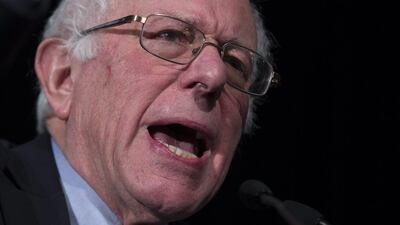Democratic Party presidential hopeful Bernie Sanders has been unfairly criticised for being a “Johnny One Note” on foreign policy because he continually reminds voters of his early opposition to the Iraq War.
To explain why he continues to emphasise the importance of his decision to oppose that war, Mr Sanders has pointed to the speech he gave in October 2002, in which he laid out five reasons why he feared the Bush administration’s march to war.
Critics and cynics have flippantly dismissed his understanding in foreign affairs and have, therefore, ignored that important speech. Because it was so prescient, it deserves attention, not scorn. Here, in short, were the five reasons he gave in 2002 for opposing the Iraq war:
The Bush Administration provided no “estimates of how many young American men and women might die ... or how many tens of thousands of women and children in Iraq might also be killed”.
He was concerned “about the precedent that a unilateral invasion of Iraq could establish in terms of international law and the role of the United Nations”.
Because the United States was “involved in a very difficult war against international terrorism”, Sanders also echoed Brent Scowcroft’s concern that “an attack on Iraq ... would seriously jeopardise, if not destroy, the global counter-terrorist campaign”.
With the US “facing a $6 trillion (Dh22tn) national debt and a growing deficit ... a war and long-term American occupation of Iraq could be extremely expensive”.
Finally, Sanders expressed his concern with the “unintended consequences” of the war. “Who would govern Iraq [after] Saddam and what role will the US play in the ensuing civil war that could develop?” In reaction to the war, would extremists destabilise other governments in the region and would the “bloody conflict between Israel and the Palestinian Authority be exacerbated?”
To understand the significance of these five points, it is important to recall the false narrative the Bush administration was pitching before the invasion, and what actually happened as a result of the disastrous decision to go to war.
In the lead-up to hostilities, George W Bush and his colleagues created an elaborate web of deceit to sell their plans. The biggest lies they told were not those about Saddam’s nuclear programme and other weapons of mass destruction. More disturbing was the rosy picture they painted about how easy the invasion would be and the positive outcomes that would follow. Defence department officials assured Congress that the effort would only require a commitment of 60,000 to 90,000 troops.
They predicted that the regime could be toppled in six weeks and the war would be won in six months, costing the US a mere one or two billion dollars, with the rest being covered by Iraqi oil revenues. American troops would be greeted by Iraqis as liberators, and “the beacon on freedom would shine bright, lighting up the Middle East”.
What happened, of course, was closer to what Mr Sanders had predicted. After eight bloody years of war and occupation, more than 4,600 Americans died, with the lives of tens of thousands more shattered by debilitating injuries and post-traumatic stress disorder (PTSD). One of the more troubling consequences of this war are the 22 veterans who commit suicide every day – meaning that the US loses more young men and women every year to PTSD-induced suicide than it lost during the entire war.
The cost of the war, the occupation and the long-term care of wounded veterans is approaching $3tn.
Compounding this tragedy are the hundreds of thousands of Iraqis who were killed in the war and the civil conflict that followed. By dismantling Iraqi institutions and attempting to create from whole cloth a sect-based Iraqi government, the Bush administration stoked latent sectarian tensions that resulted in campaigns of ethnic cleansing and a dysfunctional political order.
Instead of defeating terrorism, the war served to aggravate it, with Al Qaeda and its successor ISIL spreading to at least 16 countries. At the same time, the war and American behaviours exhibited in the war – at Abu Ghraib and Guantanamo prisons – led to a precipitous decline in respect of and support for America across the globe, putting the country at even greater risk.
One final unintended consequence of the war was not only the growth of extremist currents in the Arab world but the unleashing of an emboldened Iran on the region. With Saddam and the Taliban defeated, Iran was able to expand its influence in Iraq and project its claim to be the leader of the “resistance against the West”.
As Mr Sanders correctly notes, it wasn’t just the Bush administration that supported this disastrous war. The Democratic-led Senate passed the resolution that was used to justify the invasion.
And so, dear critics and cynics, before suggesting that Mr Sanders lacks the wisdom to conduct foreign policy, pay attention to the judgment and foresight he demonstrated in what he has rightly termed the most critical decision senators were called on to make in this century.
In bringing up his opposition to the war, he is not only distinguishing himself from his Democrat rival Hillary Clinton, who supported the invasion, he is also correctly laying the predicate for a more thoughtful foreign policy grounded in respect for international law and institutions, cooperation with partners and diplomatic engagement.
Dr James Zogby is the president of the Arab American Institute
On Twitter: @aaiusa


